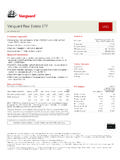Transcription of Innovations in Hospitality Industry - ed
1 CORRESPONDENCE Elena A. Dzhandzhugazova 2016 Dzhandzhugazova et al. Open Access terms of the Creative Commons Attribution International License ( ) apply. The license permits unrestricted use, distribution, and reproduction in any medium, on the condition that users give exact credit to the original author(s) and the source, provide a link to the Creative Commons license, and indicate if they made any changes. Introduction The highly competitive environment of the Hospitality Industry drives the search for new ways and elements of efficient performance. One of the core trends in this sphere is the development and application of a variety of Innovations and new elements that can serve as a powerful impetus for the development of the Hospitality Industry . Innovations of all kinds are essential for both the viability and competitiveness of hotel enterprises.
2 The systematic and ubiquitous use of Innovations to ensure the growth of enterprise performance is now recognized by a wide range of researchers and practicing managers (Dzhandzhugazova et al., 2015). INTERNATIONAL JOURNAL OF ENVIRONMENTAL & SCIENCE EDUCATION 2016, VOL. 11, NO. 17, 10387-10400 Innovations in Hospitality Industry Elena A. Dzhandzhugazovaa, Ekaterina A. Blinovaa, Liubov N. Orlovaa and Marianna M. Romanovaa aPlekhanov Russian University of Economics, Moscow, RUSSIA ABSTRACT The article focuses on the study of the role and importance of innovation, its classification, the problems of its application in the hotel Industry with emphasis on the application of sensory marketing tools in the development of the innovative marketing mix within the Hospitality Industry . The article provides an analysis of the "seven sensual notes of Hospitality ", "sight", "hearing", "smell", "taste", "touch", "intuition", "impression".
3 The authors rely on the "sensual notes" in their consideration of an innovative hotel marketing mix, generalize and systematize the results of studies, practical examples from the experience of the world best hotels. The authors have conducted a comparative analysis of research findings pinpointing the impact of the innovative marketing mix on the performance of Hospitality Industry enterprises. KEYWORDS ARTICLE HISTORY hotel Industry , Hospitality , innovation, innovative hotel marketing mix, sensory marketing Received 20 May 2016 Revised 29 July 2016 Accepted 13 October 2016 OPEN ACCESS 10388 E. A. DZHANDZHUGAZOVA ET AL. There is a wide range of factors affecting the application and development of innovation, consistent Industry problems, specific mentality of consumers, cultural and national quirks of the customers enjoying hotel services, etc.
4 (Pine & Gilmore,1999) Innovative trend in the Hospitality Industry is manifested through the ability to generate diverse Innovations , which will ensure the successful development of a hotel (Zaitseva, 2013). The large-scale application of new knowledge, as well as its combinations, generates new services, products and technologies. If a hotel is not involved in any innovation process, its performance will sooner or later diminish and its competitiveness will be lost (Ilyenkova & Kuznetsov, 2009). All kinds, types of innovation and the levels of their manifestation create the innovation space. Figure 1 shows the vision of innovation and innovation processes (Orlova, 2016). Figure 1. Innovation space In real life, there are evident gaps between the main stages of innovation and their application in the hotel Industry .
5 These gaps may be sufficiently and practically explained by limited funding, high investment risks, etc (Orlova, 2014). Materials and methods The scientific tool which was selected for the study presented herein includes such general scientific and special methods as systems analysis, retrospective analysis, expert assessments and sociological calculations based on Internet surveys. The information pool of the studywas formed with the statistical data and analysis of the Russian Federal Agency for Tourism (Rosturizm); research and development findings as well as project data developed by the Scientific and Research Institute for Hospitality Industry at Plekhanov Russian University of INTERNATIONAL JOURNAL OF ENVIRONMENTAL & SCIENCE EDUCATION 10389 Economics; publications in recognized local and foreign journals; the electronic content of Russian and foreign Internet portals.
6 This article is based on the research of independent research groups, agencies and companies such as US news & World Report, Milliman, Entertainment Media Research, Vision Critical, RED as assigned by PPL, DJS, Top Hotels, Smell and Taste Research Foundation, TripBarometer. With the informational support of Top Hotels, the authors have made a number of sociological calculations based on online surveys among hotel customers. The surveys aimed to identify the attitude of the consumers of hotel services to the quality of service. The key question in the surveys was, "How would you describe "high-quality service"?". Results and Discussion Innovations in hotel operations The ability to analyze customer feedback enables hotels to maintain a certain number of guests; the key criterion of efficiency is primarily how satisfied the guests are with the hotel services.
7 The retrospective analysis of the attitude of hotel guests to the hotel service quality conducted in 2000 and 2016 showed the ongoing sensitivity of guests to the quality of service. The research published in 2000 by the reputable media company US news & World Report proved that hotels lose the major share of their clients due to the poor quality of service. Those conclusions were based on the response analysis of the question, Why do hotels lose their customers? (Dzhandzhugazova, 2005). Figure 2. Distribution of responses to the question, Why do hotels lose their customers? The above survey results confirm the importance of the personalized service; nearly 14% of the respondents were disappointed with the service quality. The hotel services market is changing constantly; customers grow tired of the standard hotel services and tourists demand additional outside-the-box services, which leads to a higher competition in the hotel market.
8 Consumers are no longer satisfied with a comfortable and well-furnished room, they need to be impressed, convinced and even won over (Ambler, 1999). The standard 68%14%9%5%3%1%Dissatisfied with personnel attitudeDisappointed with service qualityConsider the price too highAcquire new habitsLeaveDie 10390 E. A. DZHANDZHUGAZOVA ET AL. procedure here is to analyze the factors of the competitive potential that enterprise structures possess. When such potential is properly managed, the above factors enhance the competitiveness of an enterprise in modern conditions (Orekhov, 2014). Hotels have to keep improving their services and increasing their quality through innovation management, because the needs of customers are ever-changing, new habits are acquired (5%). Innovation in the Hospitality Industry depends on the creation of intangible assets, which means providing the consumer with a benefit worth paying for.
9 In this regard, the intangible assets may be good mood, spiritual or cultural development or the provision of a unique experience (Dzhandzhugazova et al., 2016). The innovative activity is multifaceted and covers a variety of sectors, whereas the Innovations can be manifested in many forms. Foreign and Russian scientists (Schumpeter, 2007) have developed various classifications of Innovations to regulate the concept. According to the classification of Schumpeter (2007) innovation may refer to: new products, new sources of supply,new methods of production, the exploitation of new markets and new ways to organize business (management). However, all classification criteria cannot reflect the nature and characteristics of Innovations in Hospitality Industry in its entirety.
10 We believe that the most suitable in this regard are the following classification criteria: type of innovation, depth of changes, continuity, type of novelty to the existing market and innovation time-to-market (Romanova & Chernova, 2015). It should be noted, however, that few Innovations may be characterized using only one of these criteria; most Innovations manifest two or three. The following table describes the specific ways of implementing different types of Innovations in the Hospitality Industry . Table 1. Innovation types in Hospitality Industry No. Innovation type Description Specific ways to implement in Hospitality Industry 1 Material and technical Innovations Creating new materials, products, services and technologies, new ways to deliver services, improving the old ones Expanding the range of specialized and equivalent accommodation facility typesaccording to the needs of tourists 2 Economic Innovations The emergence of new markets caused by the introduction of new products or technologies, the creation of new ways to buy and sell goods, and economic processes following the innovation process Expanding the Hospitality Industry organizations from the center to the periphery.











